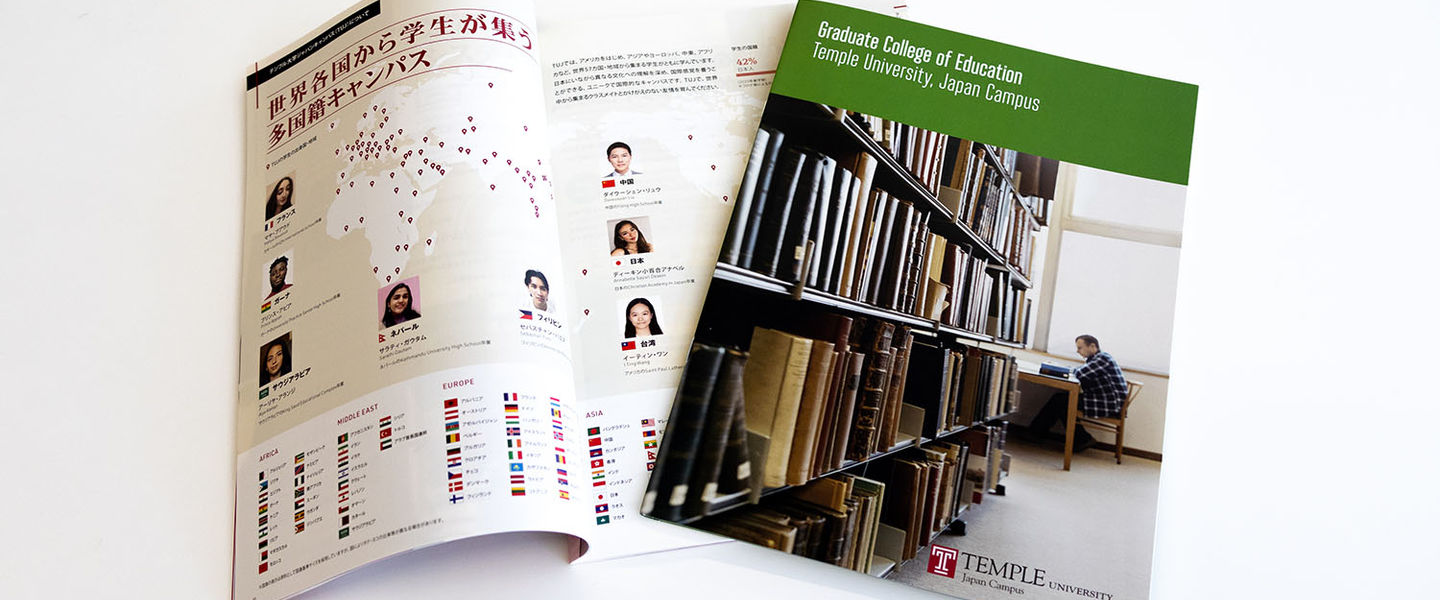2016 Commencement
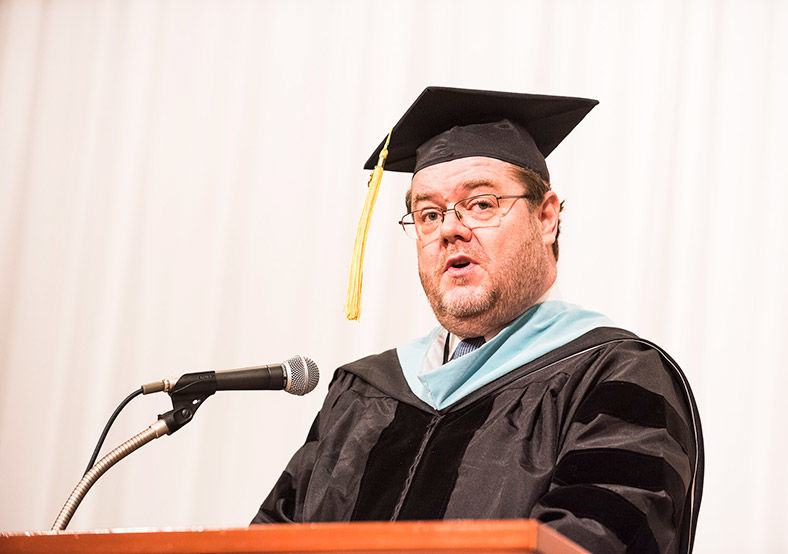
Dean Stronach, faculty, honored guests, classmates, friends and family. Thank you for the opportunity to speak to you today. I am truly honored.
I finished my degree late last year, so when a large thin envelope marked “do not bend” arrived in February, I knew what it was. I opened it carefully. I allowed my eyes to linger for a long time over the raised letters on the fine paper. Looks good. Feels nice. I enjoyed the moment. But I soon encountered a question: Now what? I had worked on my dissertation for so long that it seemed to me more like a career than an academic exercise. People would ask me, "What do you do?" "Oh, I write a dissertation." "When do you finish?" ... But it is done now, time to move on. Now what?
I was still grappling with this question when (Program Director) Min Lu asked me to make this speech. My first thought was, “Who, me?” I did not think of myself as particularly worthy of such an honor. I’m not special. My story is not unique. Why me?
Two two-word questions and no answers. To complicate matters, I’ve added the third discussed over beer one night with a classmate: what is the significance of the degrees we’d just earned. Our identities had been appended, Ph.D., Ed.D., or M.S.Ed. stapled to the backside of our names for the rest of our lives. Did they mean anything? Did they change us? The more we talked, the more I saw these questions as interwoven and embedded in our shared experience and future selves. We have to subsume the ego to get to the heart of the matter.
I was asked to speak today, not to tell my story but rather to give voice to this graduating class. Not me, all of us, how to tell that story. When we talk of graduate school experience, we tend toward lofty generalities such as dedication, hard work, struggle, sacrifice, and achievement. Those words are appropriate but inadequate or insufficient. The path to this stage was unique for each of us, a reflection of the complex and highly situated realities that comprise our lives. But I can offer glimpses of experience, and maybe they will resonate.
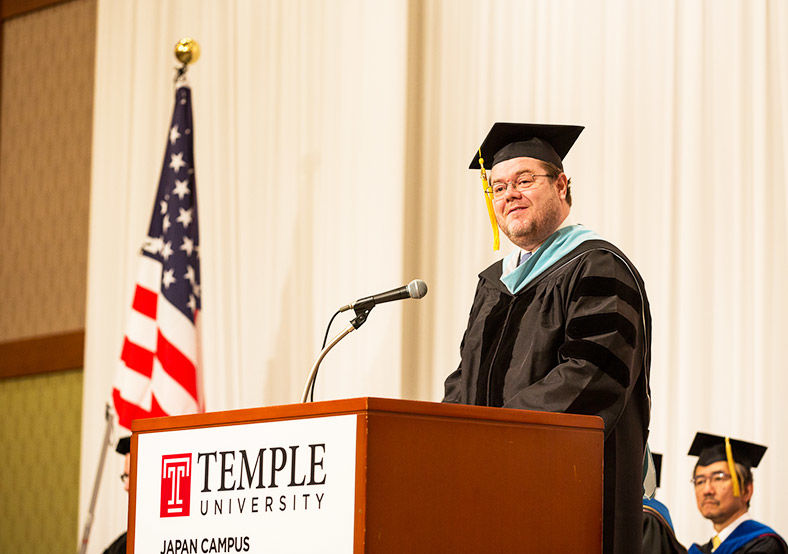
Have you ever walked into a new class and felt overwhelmed by the collective intelligence in the room, only to feel relieved to find that everyone else felt exactly the same way, and that you were all in the same boat? Have you ever missed your train stop because you were so deeply enthralled in an article you were reading for that night’s class? Have you ever lost sleep, not because the paper was due the next day, but because the ideas you were wrestling with simply would not let you go? Have you ever felt like you were drowning in work, only to be lifted up by a classmate, instructor, or advisor and placed on a solid ground? Then you know what it is like to be a part of the TUJ community.
We’ve made it. Today we celebrate, and rightly so. We’ve earned it, and we are going to enjoy it thoroughly.
But then what? Well, tomorrow at 9 am, I, like many of us, will walk into a classroom and pick up where we left off on Friday. Our students and colleagues won’t see the letters appended to our names. We won’t be wearing a cap and gown. Probably. My students will continue to struggle with paragraph structure, and I will continue to struggle to help them. I may not be any better at it than I was last week, but I will certainly be better than I was when I began this journey some years ago. After class I’ll get back to work on that research paper. A student or two will stop by my office for my advice. I’ll chop wood. I’ll carry water. We are defined not by the letters at the end of our name, or the nice paper with the raised lettering, or even by this brief moment of acknowledgement today. No, we are defined by the impulse that set us out on our journey in the first place—the desire to know more, to be better teachers and scholars, to make a difference. We are defined by the journey itself, which began long before we entered that first classroom and will continue long after this speech is forgotten.
Now what? It’s time to get back to work, to do better work than we could have done without our experience at TUJ, and let the quality of our work, not the letters that follow our names, speak. And there is so much work to do. Best not waste any time.
I'll end with one bit of advice: Get some sleep. Seriously. Sleep deprivation is a part of the graduate student’s lifestyle that we now need to put behind us. Lack of sleep is not a sign of hard work or strength. Just means we are sleepy, and as such less capable of doing great work. Celebrate today. Sleep well tonight, and get back to work tomorrow. Thank you.
マイケル・ブラッドリー・フッド
教育学博士(Ed.D.)
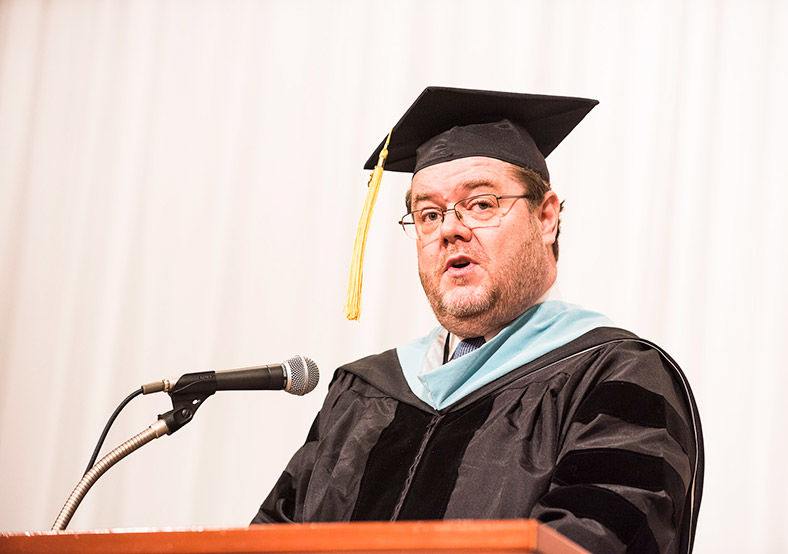
ストロナク学長、教授陣、ご来賓のみなさま、クラスメート、友人、家族のみなさん。今日みなさまに向けてお話する機会をありがとうございます。大変光栄に思います。
昨年暮れ、私は学位取得に必須な課程をすべて修了しました。ですから、大きな薄手の「折曲厳禁」と書かれた郵便物が2月に届いた時、中身は何であるかわかりました。慎重に開封しました。立派な紙に浮き出た文字の上でしばらく目を泳がせました。なかなかいい。気持ちがいい。この瞬間を満喫しました。しかし、ある質問がすぐに目の前に立ちはだかりました。さて、どうしよう?私は論文作成にとても長い時間を費やしてきて、それは学術的な実践というより、もはやキャリア、職業のようでした。誰かに「どんな仕事をしているんですか?」と聞かれると、私の答えは、「博士論文を書いています」。「いつ終わる予定ですか?」… でも、それももう終わり、前に進む時が来ました。さあ、どうしよう。
プログラム・ディレクターのMin Luさんから今回のスピーチを依頼された時、私はまだこの質問と格闘していたのです。最初に思ったことは、「誰?私に?」でした。私自身、そのような栄誉にあずかるだけの価値は自分にはないと思っていました。私はそんなに特別じゃない。私の話は特段ユニークでもない。なぜ私に?
二つの問いに答えはありませんでした。さらに事態を複雑にするように、ある夜クラスメートとビールを飲みながら議論して、三つめの問いが加わりました。私たちの取得した学位の意義とはなにか。私たちのアイデンティティに追加されたもの、この先の人生で、博士号や修士号という称号が名前の最後にホチキス留めされたのです。その称号には何か意味があったのでしょうか?それらは私たちを変えたのでしょうか?議論すればするほど、これらの問いは互いに絡み合い、私たちに共通の経験、未来の自分自身に埋め込まれているように思えました。事の神髄に迫るにはエゴを包含しなければなりません。
今日のスピーチをするにあたり、私だけの話ではなく、卒業生を代表して話をするように言われました。私ではなく、私たちすべてにとって。一体どんな話をしたらよいのか。大学院での経験について話をするとき、私たちは専心、大変な努力、奮闘、犠牲、達成といった高尚な一般論に終始しがちです。これらの言葉は妥当ですが、不適切あるいは不十分です。私たちそれぞれの道のりはユニークで、私たちの人生を構成する複雑で最前線にある現実を反映しているものでしょう。しかし、それぞれの経験を一瞥すれば、共鳴するでしょう。
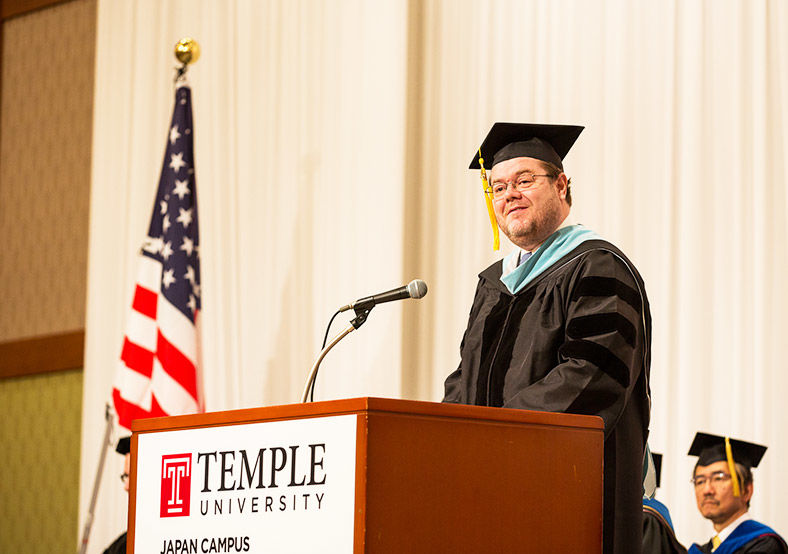
新しいクラスに足を踏み入れて、教室全体の知性に圧倒されたように感じたことがありますか?他の全員も全く同様に感じていたこと、皆さん全員が同じボートに乗っていることを知って、ほっとしたことはありませんか?その夜の授業のための読みものに夢中になりすぎて、電車を乗り過ごしたことはありませんか?翌日が論文の締め切りという理由ではなく、取り組んでいたアイデアにとりつかれて眠れなくなったことはありませんか?仕事で溺れたように感じ、クラスメート、講師やアドバイザーに抱えあげられてようやくしっかりとした地面に戻されたように感じたことはありませんか?これが理解できるなら、あなたはTUJコミュニティの一員です。
私たちはやり遂げたのです。今日は、お祝いです。そうするに十分値します。私たちは自ら手に入れ、それをこれから存分に享受するのです。
しかし、それからどうする?明朝9時、みなさんと同様、私は教室に現れ、先週金曜日に終わったところから授業を再開するのです。生徒や同僚たちは、私たちの名前に付け加わった文字には気がつかないでしょう。この帽子とガウンも身に着けたりしないでしょう。おそらく。私の生徒たちは段落構成と格闘しつづけ、私は生徒の手助けに奮闘しつづけるでしょう。先週と比べて私がより進歩しているわけではないかもしれませんが、間違いなく数年前この旅を始めた時と比べると確実に向上しているでしょう。そして、授業が終われば、また私は研究論文の執筆に戻ります。学生1人か2人は私のオフィスにアドバイスを求めて立ち寄るでしょう。私は薪を割り、水を汲むのです。私たちは、名前の後ろに付く文字や、浮き出し文字の書かれた上質紙、またこの短い時間の授与式で定義されるわけではありません。そうではなく、私たちを定義するのは、私たちがそもそもこの旅路を始めた衝動なのです。つまり、より多くを知り、よい教師となり、よい学者となり、変化を起こすという願望なのです。この旅路自体が私たちを定義します。最初に教室に足を踏み入れる前から始まり、このスピーチの内容が忘れ去られた後もずっと続く旅路なのです。
さて、どうしよう?仕事に戻って、TUJでの経験なしにはできなかった以上の成果を上げましょう。名前の後ろに付け加わった文字ではなく、その仕事の質にものを言わせましょう。そして仕事は山積みです。少しも時間を無駄にしてはいけません。
最後に一言アドバイスです。睡眠をとりましょう。本当に。睡眠不足は大学院生生活の一部ですが、今後は不必要なものです。睡眠不足は、勤勉や力を表すものではありません。ただ眠たいだけで、その結果いい仕事ができなくなります。さあ、今日はお祝いしましょう。今夜はしっかり寝て、明日には仕事に戻りましょう。ありがとうございました。

